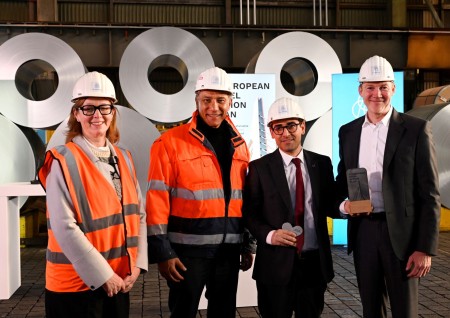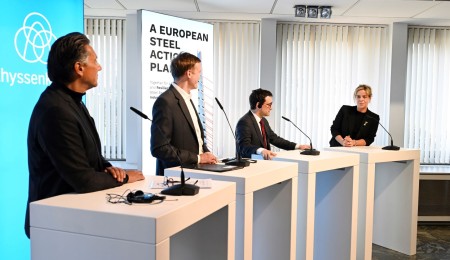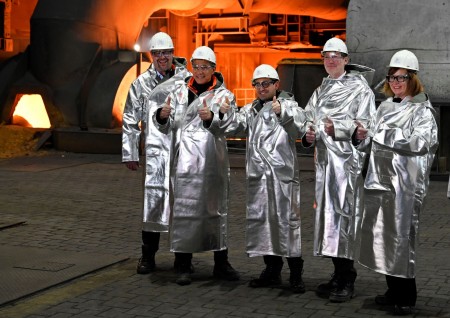Daily press, 2025-03-20, 05:15 pm
Executive Vice-President of the European Commission Stéphane Séjourné presents European Steel Action Plan at thyssenkrupp Steel in Duisburg
- Steel action plan emphasizes the strategic importance of the steel industry for Europe
- Focus is on effective trade protection measures and protection against carbon leakage
- Rapid and consistent implementation of measures necessary
Duisburg, 20.03 – Stéphane Séjourné, Executive Vice-President of the European Commission and European Commissioner for Prosperity and Industrial Strategy, today presented the European Action Plan for Steel and Metals during his visit to thyssenkrupp Steel. The initiative to strengthen the European steel industry was unveiled yesterday in Brussels, and provides for concrete steps to strengthen the industry's competitiveness. The action plan primarily prioritizes measures for consistent trade protection and an effective carbon border adjustment. Moreover, the plan addresses high energy prices and the development of lead markets for low-emission raw materials.
EU Executive Vice-President Stéphane Séjourné for Prosperity and Industrial Strategy: "It was of utmost importance to me to present the European Steel and Metals Action Plan to those workers, manufacturers and investors who make EU steel possible. We are faced with a clear and crucial choice: protect our European steel and metal industry from unfair competition while doubling down on our path to decarbonization."
Mona Neubaur, Ministry of Economic Affairs, Industry, Climate Action and Energy of the State of North Rhine-Westphalia: "The carbon-neutral transformation of the steel and metal industry is crucial for a resilient and sustainable economy in North Rhine-Westphalia, Germany and Europe. For the transformation to succeed, companies, politicians, and society must pull together. With the Steel and Metals Action Plan, the EU Commission is sending a clear signal in favor of a permanently competitive and technologically advanced steel and metals industry. Now we need to take swift action: we need effective protection mechanisms against unfair trade, competitive energy prices for our industry, and targeted investment in green lead markets. North Rhine-Westphalia is leading the way here with projects such as tkH2Steel in Duisburg – as a blueprint for carbon-neutral steel production from and for Europe."
Dennis Grimm, Spokesman of the Executive Board of thyssenkrupp Steel: "It means a lot to us that Executive Vice President Séjourné presented and explained the European Steel Action Plan here in Duisburg today. This shows us that the EU Commission is clearly aware of the existentially difficult situation in the industry, and wants to take countermeasures with the measures in the action plan. It must be clear to everyone that the combination of massive global overcapacity, inadequate trade protection, excessively high energy prices, and the challenges of transformation are endangering the very substance of our industry. Last year alone, nine million metric tons of capacity were shut down in Europe. The Steel Action Plan represents a pioneering step toward securing the competitiveness and decarbonization of the European steel industry. Particularly noteworthy is the clear prioritization of trade protection, which is crucial for securing the competitiveness of the European steel industry. What matters now is consistency and speed in putting it into effect. There is no time to lose. Our thanks go to the EU Commission, which has made steel its topic."
Tekin Nasikkol, Chairman of the General Works Council at thyssenkrupp Steel: "Today's presentation of the European Steel Action Plan is a strong signal to the entire industry: the EU recognizes the strategic importance of the steel industry – and Europe's heart of steel beats in Duisburg! Now these words must be followed by consistent action! It is not just about preserving an industry, but also about secure, well-paid jobs, value creation in Europe, and the future of climate-friendly steel production.
If we want fair competition, then we must not allow uncontrolled imports of steel produced under conditions that would no longer be permitted in Europe. To achieve this, we now need effective trade protection.
The announced minimum quotas for European steel in strategic sectors are a first step in the right direction. But that alone is not enough – we need clear legal regulations to ensure that European companies also use European steel!
Another key issue is the supply of affordable, clean energy. Without a significant reduction in energy costs, we will not be able to maintain competitive steel production in Europe. This now has absolute priority!
And finally: without people, there will be no successful transformation. We expect the EU to focus not only on the economic dimension, but also on the protection of employees. Massive investment in further training and qualifications is needed to ensure that the transformation is socially just.
As works councils, we will be keeping a close eye on whether the measures announced by Brussels actually materialize. And we will continue to fight for Europe to have a strong, innovative and socially just steel industry!"







